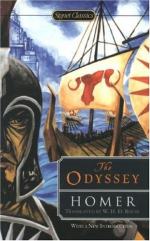Then Nestor of Gerenia, lord of chariots, made answer: ’Dear friend, seeing thou dost call these things to my remembrance and speak thereof, they tell me that many wooers for thy mother’s hand plan mischief within the halls in thy despite. Say, dost thou willingly submit thee to oppression, or do the people through the land hate thee, obedient to the voice of a god? Who knows but that Odysseus may some day come and requite their violence, either himself alone or all the host of the Achaeans with him? Ah, if but grey-eyed Athene were inclined to love thee, as once she cared exceedingly for the renowned Odysseus in the land of the Trojans, where we Achaeans were sore afflicted, for never yet have I seen the gods show forth such manifest love, as then did Pallas Athene standing manifest by him,— if she would be pleased so to love thee and to care for thee, then might certain of them clean forget their marriage.’
And wise Telemachus answered him, saying: ’Old man, in no wise methinks shall this word be accomplished. This is a hard saying of thine, awe comes over me. Not for my hopes shall this thing come to pass, not even if the gods so willed it.’
Then the goddess, grey-eyed Athene, spake to him again: ’Telemachus, what word hath escaped the door of thy lips? Lightly might a god, if so he would, bring a man safe home even from afar. Rather myself would I have travail and much pain ere I came home and saw the day of my returning, than come back and straightway perish on my own hearth-stone, even as Agamemnon perished by guile at the hands of his own wife and of Aegisthus. But lo you, death, which is common to all, the very gods cannot avert even from the man they love, when the ruinous doom shall bring him low of death that lays men at their length.’
And wise Telemachus answered her, saying: ’Mentor, no longer let us tell of these things, sorrowful though we be. There is none assurance any more of his returning, but already have the deathless gods devised for him death and black fate. But now I would question Nestor, and ask him of another matter, as one who above all men knows judgments and wisdom: for thrice, men say, he hath been king through the generations of men; yea, like an immortal he seems to me to look upon. Nestor, son of Neleus, now tell me true: how died the son of Atreus, Agamemnon of the wide domain? Where was Menelaus? What death did crafty Aegisthus plan for him, in that he killed a man more valiant far than he? Or was Menelaus not in Argos of Achaia but wandering elsewhere among men, and that other took heart and slew Agamemnon?’




